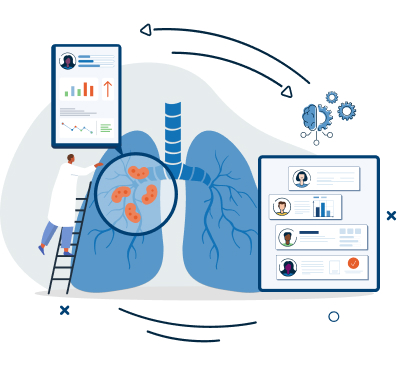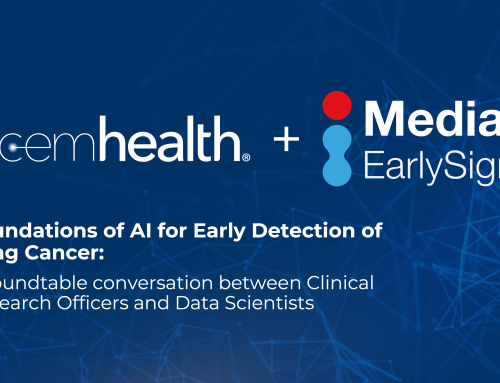
Reveal: The Future of Lung Cancer Detection
Today, on behalf of our small but mighty solutions team at Lucem Health, I am thrilled to share something that has us extremely excited about the future of lung cancer care. We’ve launched a new solution, Reveal for Lung Cancer, designed to accelerate treatment of lung and tracheal cancers.
The Challenge of Early Lung Cancer Detection
Lung cancer stands as one of the coldest, most unforgiving mountain peaks in the landscape of cancer care. It’s the leading cause of cancer death worldwide, claiming more lives than breast, prostate, and colorectal cancers combined. In 2020 alone, lung cancer accounted for an estimated 1.8 million deaths globally, according to the World Health Organization. [1]
Image source: Global burden and trends of lung cancer incidence and mortality
Despite its prevalence and associated morbidity, the path to early lung cancer detection has been shrouded in fog. Only 6.5% of eligible adults in the United States get screened for lung cancer, leaving a staggering majority vulnerable to late-stage diagnosis. [2] The consequences are dire: 45% of non-small cell lung cancer cases, the most common type, remain undetected until they’ve reached Stage 4, when survival rates plummet to a mere 9%. [3]
The challenges of early lung cancer detection are multifaceted:
1. A Sleeping Giant
Symptoms often don’t appear until the disease has advanced, making it difficult for patients to seek timely care. Even when symptoms do arise, they can be easily mistaken for other respiratory conditions, leading to misdiagnosis and delayed treatment.
2. Struggles with Diagnosis Accuracy
Current screening methods, such as low-dose computed tomography (LDCT) scans, have limitations. While LDCT scans can detect lung cancer at earlier stages, they also have a high false-positive rate, leading to unnecessary invasive procedures and patient anxiety. This, coupled with the lack of awareness about lung cancer screening guidelines, contributes to the low screening rates we see today.
3. The Economic Burden
The economic burden of late-stage lung cancer detection is staggering. Between 2020 and 2050 experts expect tracheal, bronchus, and lung cancer to account for 15.4% of the $25.2 trillion in estimated global economic cost of cancers. [4] And with late-stage treatment accounting for a significant portion of these expenses. Early detection not only saves lives but also has the potential to reduce healthcare costs substantially.
The need for improved, earlier-stage lung cancer detection isn’t just necessary–it’s urgent. With every passing day, we lose countless lives to this devastating disease, and the ripple effects extend far beyond the patient, impacting families, communities, and healthcare systems. It’s time to clear the fog and pave a new path towards early detection, one that harnesses the power of innovative technology and data-driven insights to transform the future of lung cancer care.
Reveal: AI-Driven Lung Cancer Detection
Enter Reveal for Lung Cancer – an AI-driven compass that guides us through the fog to identify those at higher statistical risk of lung cancer earlier than ever before. By leveraging data from electronic health records (EHR) and a proven AI model, Reveal flags individuals at higher apparent risk, focusing on ever-smokers aged 40-89, streamlining their path to screening and early intervention.
How Reveal for Lung Cancer Works
Reveal for Lung Cancer analyzes existing EHR data to identify patients who show a higher statistical risk of certain respiratory illnesses, including cancers of the lung or trachea. It’s like having a detective dedicated to catching lung cancer in its tracks, offering health systems the chance to engage patients earlier and more effectively.
The Impact of Early Lung Cancer Detection
Imagine diagnosing 60% more early-stage lung cancer patients. That’s not a dream; it’s the reality with Reveal for Lung Cancer. In a cohort of 58,000 screening-eligible individuals, early detection with Reveal creates the opportunity to save or prolong over 160 more lives. By flagging nearly 50% of likely lung cancer cases in a typical population, we’re opening doors to hope, treatment, and survival.
Partnering for a Healthier Tomorrow
We believe that the path to impacting lung cancer care is through collaboration and partnership. That’s why we’re proud to join with Mercy, one of the largest and most innovative health systems in the United States. We have a shared vision of transforming healthcare through cutting-edge technology and patient-centric solutions. Our partnership testifies to the power of collective action for better patient outcomes.
Mercy’s commitment to delivering high-quality, compassionate care aligns seamlessly with our mission at Lucem Health. By integrating Reveal for Lung Cancer into Mercy’s extensive network of hospitals and clinics, we seek to accelerate access to life-saving treatment.
Further, our solution comes from a multi-year partnership with Medial EarlySign, whose dedication to high-quality research and thoughtful data science enables actionable clinical insights, meaningful improvements in patient care, and higher quality outcomes.
But our partnerships extend beyond technology. Working hand in hand, our clinicians, data scientists, and engineers combine our collective expertise, resources, compassion, and determination to make a difference in the lives of those affected by lung cancer.
Join the Fight Against Lung Cancer
At Lucem Health, we’re not just developing technology. We’re crafting keys to unlock a future where lung cancer no longer holds the same power to devastate lives. Reveal for Lung Cancer is more than a solution; it’s a guardian, a guide, and a glimmer of hope in the fight against the deadliest cancer worldwide.
Read more in our press release: Lucem Health Launches Reveal for Lung Cancer, A New AI-Driven Solution to Accelerate Lung Cancer Screening for At-Risk Patients
Learn more about Reveal for Lung Cancer: Reveal for Lung Cancer


